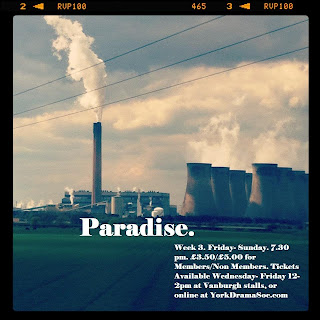It is performed on a completely bare stage, save for one
chair in the centre where Ricky sits broodingly, as the audience enter. This
starkness, jarring at first, pulled our focus immediately onto Ricky and made
sure it stayed there; no distractions of set, lighting or sound, just one man
and what he has to say.
Smith’s writing showed promise in places. Ricky’s speech
alternates between personal anecdotes and bitter asides to the audience,
interspersed with moments of comical, often bleak insight into the student
condition (Ricky reveals he is at York University), and some witty manipulation
of language.
However, the play simply doesn’t have enough content to
stand up on its own. Many of the jokes seemed recycled – he talks repeatedly
about how awful the North of England is, a reference that grows tiresome after
a while – or not strong enough to provoke great laughter from the audience;
Ricky’s rantings about the apparent racism of Dolmio adverts and the
pointlessness of condoms felt more like an attempt at stand-up rather than
giving us any great insight into his character.
This, combined with its incredibly short length of 27
minutes meant that I neither sympathised with Ricky as a person nor understood
just why, in the end, he was so depressed. The play just didn’t seem to have a
coherent development or any clear resolution, which left me dissatisfied as an
audience member.
Howard Thompson gave a commendable performance as Ricky. He
displayed dynamism and vigour, exploiting his vocal capabilities to good effect
in Ricky’s more incensed passages. This
contrasted nicely with a great pensiveness during his more self-reflective
moments. Thompson’s performance though, could only be so good due to the
material.
I felt the play either needed to be twice its length, or
teamed with a series of similar monologues from different characters on the
subjects that this one covers, such as the student experience, or how we all,
as people, share a loneliness and insecurity which we never admit to. Themes
which Smith seemed to be able to tap into, but never seemed to go further than
just skimming the surface.
Paradise would have been perfect material as a
work-in-progress piece for an Open Drama Night on a Monday evening. I do not
feel though that, in its current form, the Drama Society should be putting it
on and be expecting audiences, students or otherwise, to pay to come and see
it. It does not represent value for money.
You can hear Alex’s full audio review today at 2 inYorWorld.












